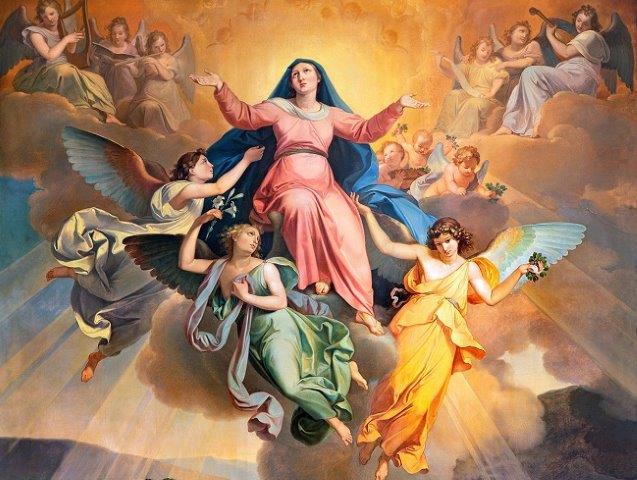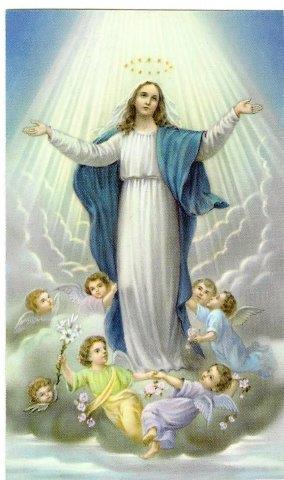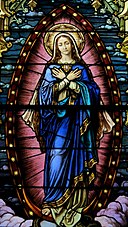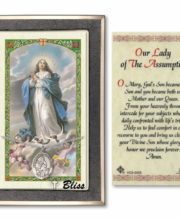Mary
Why Do Catholics Celebrate the Feast of the Assumption?
 The Feast of the Assumption of Mary, is a major feast day in the Catholic Church, celebrating the belief that Mary, the mother of Jesus, was assumed into heaven, body and soul, at the end of her earthly life. This feast is an important reminder of the central role that Mary plays in the life of the Church, and is celebrated with great joy and devotion by Catholics around the world.
The Feast of the Assumption of Mary, is a major feast day in the Catholic Church, celebrating the belief that Mary, the mother of Jesus, was assumed into heaven, body and soul, at the end of her earthly life. This feast is an important reminder of the central role that Mary plays in the life of the Church, and is celebrated with great joy and devotion by Catholics around the world.
Why do Catholics celebrate the Solemnity of Mary?
-
To honor Mary’s role as the mother of Jesus: Mary is a central figure in the life of the Church, as she is the mother of Jesus, the Son of God. The Solemnity of Mary is a special opportunity to honor Mary and to give thanks for her role in bringing Jesus into the world.
-
To recognize Mary’s unique relationship with Jesus: Mary’s relationship with Jesus was unlike any other. She was the mother of the Son of God, and she played a vital role in his earthly ministry. By celebrating the Solemnity of Mary, Catholics recognize the unique bond that existed between Mary and Jesus, and give thanks for the blessings that flowed from this relationship.
-
To reflect on Mary’s virtues: Mary is often held up as a model of faith, virtue, and holiness. By celebrating the Solemnity of Mary, Catholics are invited to reflect on Mary’s virtues and to emulate them in their own lives.
-
To celebrate Mary’s assumption into heaven: The belief in Mary’s assumption into heaven is a central part of Catholic faith and tradition. By celebrating the Solemnity of Mary, Catholics give thanks for this belief and the hope that it brings.
-
To honor Mary’s role as a mediator: Mary is often seen as a mediator between God and humanity, interceding on behalf of those who ask for her help. The Solemnity of Mary is a special opportunity to honor Mary’s role as a mediator and to ask for her intercession.
-
To celebrate Mary’s role as the mother of the Church: Mary is not only the mother of Jesus, but she is also the mother of the Church. By celebrating the Solemnity of Mary, Catholics give thanks for Mary’s maternal love and care for the Church, and for her ongoing presence and guidance in the life of the Church.
When is the Feast of the Assumption?
The Catholic Church celebrates the feast of the Assumption on August 15th, although it is a holy day of obligation in some countries and not in others. The United States Conference of Catholic Bishops (USCCB) have consecrated the United States to the Blessed Virgin Mary.
If the feast of the Assumption falls on a Saturday or a Monday, the requirements to attend mass on the holy day of obligation can be fulfilled by celebrating the feast on following Sunday in the United States.
There are a number of reasons why August 15th was chosen as the date for the Feast of the Assumption. In the early centuries of Christianity, various Christian communities celebrated the “Dormition of the Theotokos” (the Falling Asleep of the Mother of God) in the Eastern Church, which referred to Mary’s peaceful death. Another reason is that August 15th is the midpoint of the summer, which is a time of harvest and abundance. This is seen as a fitting time to celebrate the Assumption of Mary, who is often seen as the “harvest of the human race.”
Over time, the celebration of Mary’s Assumption into heaven became connected to this commemoration. By the 5th century, the Feast of the Assumption of Mary was widely celebrated in Jerusalem. By the 6th century, it was being celebrated throughout the Eastern Church. The Western Church began celebrating the feast in the 8th century. August 15th gradually emerged as the commonly accepted date.
August 15th is close to the Feast of the Transfiguration of Jesus, which is celebrated on August 6th. These feasts complement each other, emphasizing the glory and transformative power of God.
What is celebrated on the Assumption of Mary?
 The Assumption of Mary, also known as the Assumption of the Virgin, is the belief that Mary, the mother of Jesus, was assumed into heaven. This means that Mary entered heaven both body and soul, at the end of her earthly life. This belief is a central part of Catholic faith and tradition, and is celebrated on the feast of the Assumption.
The Assumption of Mary, also known as the Assumption of the Virgin, is the belief that Mary, the mother of Jesus, was assumed into heaven. This means that Mary entered heaven both body and soul, at the end of her earthly life. This belief is a central part of Catholic faith and tradition, and is celebrated on the feast of the Assumption.
The story of Mary’s assumption into heaven is not found in the Bible, but rather is based on tradition and the teachings of the Church. According to tradition, Mary lived a holy and virtuous life, and was uniquely chosen by God to be the mother of Jesus. After Jesus’ death and resurrection, Mary remained on earth for a time, spreading the Gospel and caring for the early Church.
As Mary approached the end of her earthly life, she is said to have been visited by the apostles, who wished to pay their respects and say goodbye. According to tradition, Mary was taken up into heaven, body and soul, in the presence of the apostles.
According to tradition, Mary is the only person with the distinction of rising to heaven both body and soul. Mary was sinless and full of grace, and played a vital role in the redemption of humanity through her cooperation with God’s plan of salvation. It is believed that Mary’s assumption into heaven was a reward for her faith and her role in the salvation of the world.
Tradition tells us this miraculous even occurred on August 15th which is the date that the feast is celebrated throughout most of the world.
The belief in Mary’s assumption into heaven is a source of hope and inspiration for Catholics, as it reminds us of the promise of eternal life and the possibility of being united with God in heaven. Mary is often seen as a mediator between God and humanity, and Catholics often turn to her for intercession and guidance.
The Solemnity of Mary is a joyous and meaningful celebration in the Catholic Church. By honoring Mary’s role as the mother of Jesus, recognizing her unique relationship with Jesus, reflecting on her virtues, celebrating her assumption into heaven, honoring her role as a mediator, and celebrating her role as the mother of the Church, Catholics can fully participate in this feast and give thanks for the many blessings that flow from Mary’s life and example.
Popular Assumption of Mary Items
Prayers for the Assumption of Mary
O God, who by the glorious resurrection of Your Son, Jesus Christ, have conferred on the world the gift of life and light, mercifully grant that Your holy Virgin Mary may rejoice at the close of her earthly life with a like resurrection and like glory. Through the same Christ our Lord. Amen.
Traditional Hail Mary Prayer for the Assumption of Mary
Hail Mary, full of grace, the Lord is with thee. Blessed art thou among women, and blessed is the fruit of thy womb, Jesus. Holy Mary, Mother of God, pray for us sinners, now and at the hour of our death. Amen.
Prayer for the Solemnity of Mary
O God, who by the fruitful virginity of blessed Mary, Your Virgin Mother, have given to mankind the reward of eternal salvation, grant, we beseech You, that we may experience her maternal intercession and loving kindness, through whom we have been made worthy to receive the Author of life, Jesus Christ, Your Son. Who lives and reigns with You in the unity of the Holy Spirit, one God, forever and ever. Amen.
How to celebrate the Feast of the Assumption of Mary (Solemnity of Mary)
 There are many ways to celebrate the Solemnity of Mary, also known as the Feast of the Assumption. Here are a few ideas:
There are many ways to celebrate the Solemnity of Mary, also known as the Feast of the Assumption. Here are a few ideas:
-
Attend Mass: The Solemnity of Mary is a holy day of obligation in the United States, celebrated on January 1st each year. This means that Catholics are required to attend Mass on this day. You can celebrate the feast by participating in a Mass dedicated to Mary and giving thanks for her life and example.
-
Pray the Rosary: The Rosary is a popular devotion to Mary, and praying the Rosary is a meaningful way to celebrate the Solemnity of Mary. You can pray the Rosary alone or with others, using traditional or contemporary Rosary resources.
-
Participate in devotions: There are many other devotions that are associated with Mary, such as the Angelus, the Divine Mercy Chaplet, and the Miraculous Medal. Participating in these devotions is a meaningful way to celebrate the Solemnity of Mary and to honor her role in the life of the Church.
-
Do acts of service: Mary was known for her humility and her love for others, and one way to celebrate the Solemnity of Mary is to do acts of service in her honor. You can volunteer at a local charity, visit the sick, or perform other acts of kindness as a way of emulating Mary’s example and showing her love to others.
-
Reflect on Mary and how you can immolate the example of the Blessed Virgin Mary in your own life.
How Catholics Celebrate the Feast of the Assumption of Mary around the World
- Italy: In Italy, the Feast of the Assumption is a national holiday. People celebrate by attending Mass, going to festivals, and eating special foods. In some parts of Italy, there is a tradition of carrying statues of Mary through the streets in a procession.
Spain: In Spain, the Feast of the Assumption is also a national holiday. People celebrate by attending Mass, going to festivals, and eating special foods. In some parts of Spain, there is a tradition of setting off fireworks.
- Poland:
In Poland, the Feast of the Assumption is known as the Feast of Our Lady of Herbs. People celebrate by attending Mass, going to festivals, and eating special foods. In some parts of Poland, there is a tradition of making bouquets of herbs and flowers to be blessed at church.
Sicily: In Sicily, there is a tradition of abstaining from fruit for the first two weeks of August in honor of Mary. On the Feast of the Assumption, all types of fruit are blessed at church and then eaten.
The Catholic Church’s Teachings about the Assumption of Mary
In 1950, Pope Pius XII declared the Assumption of Mary official dogma of the Roman Catholic Church in the Aapostolic Constitution: Munificentissimus Deus. The Catholic Church teaches that the Virgin Mary “having completed the course of her earthly life, was assumed body and soul into heavenly glory.”
According to Catholic belief, the Assumption of Mary is a unique privilege granted to her by God. It affirms that, due to her Immaculate Conception (the belief that Mary was conceived without original sin), she was preserved from the corruption of the grave and did not undergo the normal process of bodily decay after death.
The dogma of the Assumption is based on a combination of scriptural interpretation, theological reflection, and tradition. Although the Bible does not explicitly mention the Assumption, it contains passages that support the concept, such as the reference to Mary being “full of grace” (Luke 1:28) and the depiction of her as the Ark of the New Covenant (Revelation 11:19-12:1).
Additionally, the belief in the Assumption has deep roots in early Christian tradition. From the earliest centuries, Christians held a profound reverence for Mary, recognizing her unique role as the Mother of God. Various writings, liturgical prayers, and accounts of the early Church Fathers attest to the belief in Mary’s Assumption.
The dogma of the Assumption was formally defined by Pope Pius XII after extensive consultation with bishops around the world and an examination of theological arguments and historical evidence. In Munificentissimus Deus, the Pope stated that “the Immaculate Mother of God, the ever-virgin Mary, having completed the course of her earthly life, was assumed body and soul into heavenly glory.”
The Assumption is celebrated as a solemnity in the Catholic Church on August 15th, a day known as the Feast of the Assumption. It is a joyous occasion to honor Mary’s unique role in salvation history and her special place in God’s plan. It is also a time to reflect on the hope of resurrection and the promise of eternal life for all believers.
The dogma of the Assumption underscores the Catholic belief in the dignity of the human body, the power of God’s grace, and the profound bond between Mary and her divine Son, Jesus Christ. It invites Catholics to contemplate the ultimate destiny of all the faithful and to seek Mary’s intercession as they journey towards union with God in heaven.



